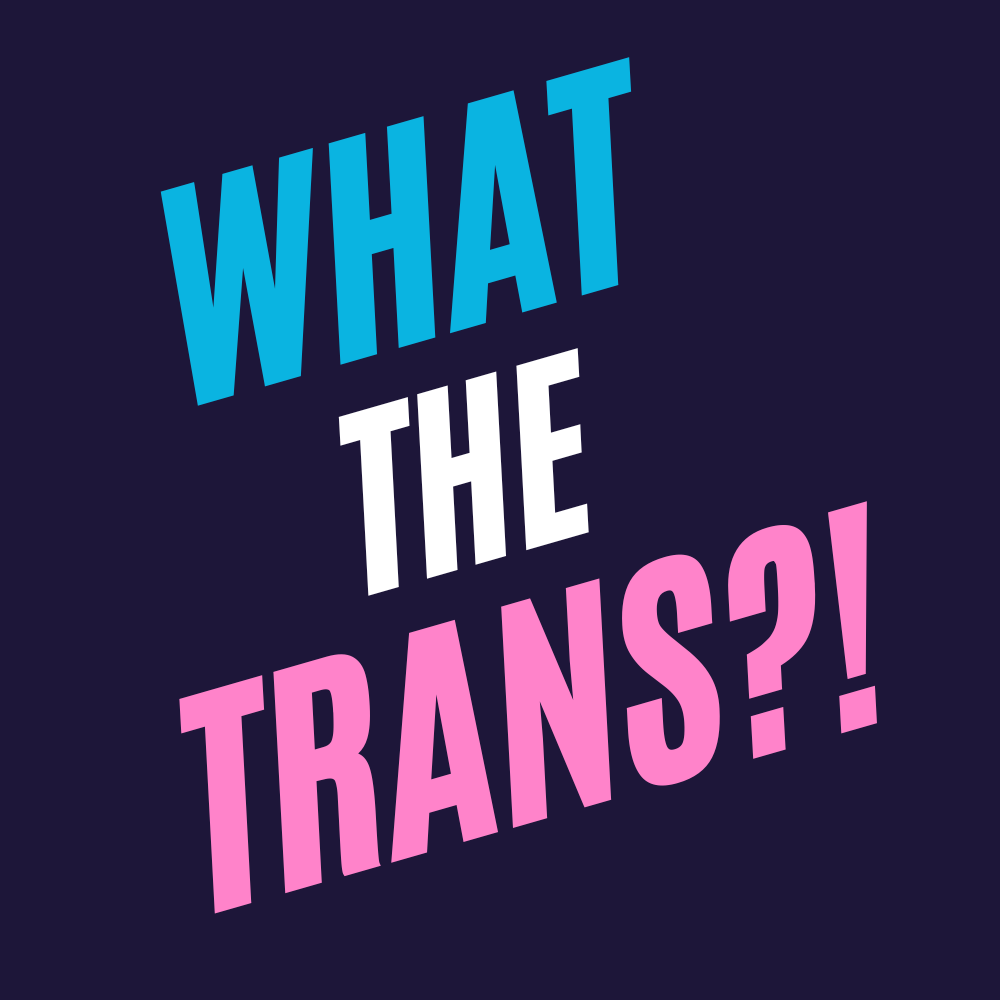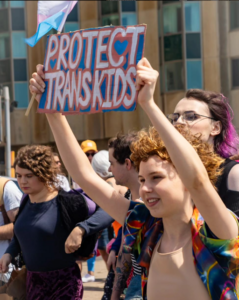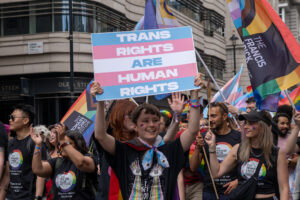The Equality and Human Rights Commission sent out unsolicited letters in April 2024 to various trans organisations mere days ahead of its accreditation review from the United Nations Global Alliance of National Human Rights Institutions (GANHRI), following submissions from multiple LGBT advocacy groups detailing its recent change in position on trans rights among other shortcomings.
WhatTheTrans were given a full copy of the letter in its entirety, and we wish to compare its arguments to reality, so have undertaken research and spoken to someone working in a trans organisation that has had multiple dealings with the EHRC. This also provided upsetting but incredibly important insight into what it is like to work with them during this time, and how we got here.
The letter starts as so, we have placed in bold the parts that we will discuss (and so you don’t tune out) we have left it unaltered asides from that formatting:
“I hope this letter finds you well. I am writing to highlight our recent and planned work in relation to sexual orientation and gender reassignment, and in particular areas where we consider there are opportunities to engage positively and collaborate on matters within the remit of the Equality and Human Rights Commission (EHRC).
As you will be aware the UN Sub-Committee on Accreditation (SCA) is due to undertake a review of the EHRC’s accreditation status, following representations made by stakeholders. We are disappointed that we will have to defend our accreditation status in this way, and we strongly reject claims that we are not compliant with the Paris Principles. However, I seek to emphasise our determination, irrespective of the outcome, to continue defending the interests of groups across all nine protected characteristics, including those with the protected characteristics of Sexual Orientation and Gender Reassignment. It is our fundamental duty to protect and promote rights for all, as per the UK’s equality and human rights laws, and we take this with the utmost seriousness.”
Right from the beginning the purpose of this letter becomes clear, the first paragraph states sweet intentions of “opportunities to engage positively” but is immediately undermined by the next that shows the real reason for communication. They bring up the review that was happening at the time into whether the EHRC should retain its A status as a National Human Rights Institution (NHRI), if it follows the Paris Principles (a requisite for it to maintain its status), and the fact that it was instigated by LGBT groups who were frustrated with the lack of… well, positive engagement.
Stakeholders in this context mean organisations and individuals who work with the EHRC in its job as an equality watchdog, many of the recipients are stakeholders. This letter is clearly a defence to the representations made to GANHRI by LGBT and Trans organisations, but written as if to curry favour, likely after the review of 2022 concluded they needed to work more with their stakeholders- which according to our source has not occurred following the recommendation.
When asked about whether such relationships have been maintained and what the relationship is like between the EHRC and trans orgs we were told that at no point were trans rights groups involved in the changes occurring since the appointment of Baroness Falkner (the school guidance, puberty blockers, etc). According to them the EHRC have been ignoring orgs and damaging relations so much that now most orgs no longer engage with them directly. When asked how they felt when they read the letter, they said it felt completely disingenuous, a ploy to appear as if they’re working on GANHRI’s recommendations without actually putting in the work.
“You will no doubt be aware that several of the concerns we have articulated over the past few years, with regard to government consultations and proposed legislation, have been informed by the benefit of our expert analysis of the law and careful consideration of the human rights and equality considerations of children and young people, adult LGBT people and sex-based rights. Many of our positions have recently been upheld either through litigation or in the recent final report of Dr Hilary Cass and her independent review. We intend to carefully consider her findings and urge all those who are working with and providing services for children and young people, to urgently focus themselves on the task of implementing Dr Cass’s recommendations in full. They must work cooperatively and professionally to deliver the quality services that our children and young people deserve.”
Immediately we come to a screeching halt, the statement about positions being upheld in law and the Cass Review are incredibly misleading and many who received this letter likely immediately know. The Cass review has been roundly rejected by many trans groups like Trans Safety Network for its poor science, most recently it was rejected by the World Professional Alliance for Transgender Health (WPATH), the global organisation for promoting actual evidence-based healthcare for trans people. The Endocrine Society has also released a statement of the review’s shortcomings regarding its review of hormone treatments. We here at What the Trans are of the opinion that the Cass review is part of a larger push to prevent trans people from accessing healthcare, especially now that puberty blockers have been banned a second time using the Cass review.
The comment regarding litigation and legal analysis also creates pause for thought, and raises the concern of conflicts of interest. We have previously reported on the continued actions of EHRC Commissioner Akua Reindorf in her representation of Anti-trans groups such as LGB Alliance and meeting with various anti trans networks including those at the guardian.
Translucent’s investigations have also detailed how EHRC Commissioner Alasdair Henderson has many conflicts of interest with the EHRC on trans rights, including working on anti-trans cases (including Tavistock v Bell and the Forstater Case) and having connections to anti-trans orgs. Hendersen was the Vice Chair for the board of trustees of the Lawyers Christian Fellowship, a group that works with the Alliance Defending Freedom and attended their symposium. He also represented Christian Concern in their filing against cambridge university, a group that calls a Conversion therapy ban an “anti- christian campaign”
To say that your opinions are backed up in litigation, and that you have “expert analysis of the law” without mentioning that your own commissioners are leading lawyers for anti-trans groups and individuals to meet with and be represented by is at best manipulative and realistically an egregious misrepresentation of the truth. While Henderson did declare a conflict of interest in Bell but not others, the EHRC chose to let him continue contributing on trans issues
“I would also like to highlight that we recently responded to the Department for Education’s recent consultation on their draft guidance for English schools regarding gender-questioning children. In this we have highlighted the importance of making clear that children can have the protected characteristic of gender reassignment, and that schools should be aware of the need to prevent discrimination against them on the basis of that characteristic.”
The note about the School Guidance feels just as misleading when you learn that Hendersen, alongside Isabelle Trowler, who just so happens to be EHRC Commissioner Akua Reindorf’s wife, were involved in the now infamous draft guidance that said schools should not respect trans children’s transition and take a parent-focused approach (i.e outing trans children to family against their will). This push has snowballed into a new section 28 that denies children under 9 not only knowledge of trans people but vital knowledge to prevent sexual abuse, such as appropriate boundries, and consent.
Christian Concern, who Hendersen represented, have campaigned for a total ban on children being able to learn about LGBT topics in school during the time when Teresa May’s government were supportive of LGBT rights, even considering making the inclusion of LGBT topics in schools mandatory, (just to show how out of step this group is).
The fact that the EHRC had to put out a response reminding the government of The Equality Act and trans children are under its protection feels far less encouraging when you realise that they’re having to directly address a conflict of interest caused by their own commissioners’ work. It’s phrased as if they are defending us but the situation is closer to someone throwing something at you from behind, then running over and saying they’ll protect you from the culprit.
This growing hostility in house at the EHRC may be from supportive people leaving due to anti-trans commissioners and rhetoric being encouraged. When asked about this our source said over time the replacements have been more and more compliant with the EHRC Board and Chair’s position of hostility towards the transgender community, while hiding behind false claims of ‘Impartiality’. Over time the tone of contact has become colder and more hostile. In their opinion, the whole board of commissioners would need to be replaced in order for the EHRC to be effective again in its duties.
“Over the past three years we have engaged repeatedly with Ministers in the Department for Health and Social Care to highlight the ongoing issues with unacceptably long waiting times to access Gender Identity Services, particularly in England. These were highlighted in our flagship 2023 report, the Equality and Human Rights Monitor. NHS England rolled out several pilot schemes to help address this issue, and we have been pleased to see that two of these schemes have been awarded contracts to provide gender identity services in the longer-term. However, we continue to hear concerns about waiting times and the provision of interim support, including mental health services, for those on waiting lists. We will continue to highlight the importance of reducing these waiting times.”
This paragraph sounds fairly supportive and straight forward, however remember that the proposed answers to these problems are not self ID nor an informed consent model, it is the Cass Review and bans on puberty blockers. The services referenced here were all set up before the 2023 report.
It feels underhanded for the EHRC to try and take credit for the services existing, and is reminiscent of the faux pas that Liz Truss got into when she said that her government would be opening new treatment centres for trans people which were already up and running for some time before then.
In fact, Truss was talking about some of the same services that the EHRC are also referencing here, and eagle-eyed readers who click on the source links will notice the date of that article was 2020… which is four years ago now, but that doesn’t line up with the EHRC’s letter of “over the last three years”…
Yet again the bare minimum of ensuring access to care is fluffed up into new shinier looking things without mentioning that the attacks on those services are coming from within the UK government, EHRC and other public institutions. Encouraging services to be set up only to work tirelessly to restrict their ability to provide care in practice is maliciously cruel.
“On the long-awaited ban on conversion practices for sexual orientation and gender identity, we wrote to the Minister for Women and Equalities in October 2023 to once again call for this draft legislation to be published. It is imperative that a ban is drafted in a way which protects LGBT people from cruel, unnecessary, and harmful activity conversion practices, while ensuring that it does not restrict legitimate and appropriate counselling, therapy or support. We would welcome the opportunity to speak with you about these matters in the coming months.”
The EHRC’s most recent statements about the conversion ban at time of writing are the letter from 2023 and a November response to the 2023 King’s speech which omitted the Conversion Ban Bill. Both statements gave support for the bill to go ahead for both sexuality and gender. But in the context of the lack of quality from the EHRC regarding trans rights, including their original response on CT was to call for the exclusion of trans people from the ban entirely, so their latest response the line about ensuring “appropriate” counselling reads like a dog whistle for ensuring loopholes due to the extreme connections of some commissioners.
Especially when we understand the Cass Review (that the EHRC is incredibly supportive of) has its own connections to conversion therapy including Cass herself making the ludicrous statement to Scottish Parliament’s Health Committee that a conversion therapy ban would “frighten men and women doing their jobs” just a month after the report. She also said this to Kemi Badendoch who is now tasked with writing the legislation. Such statements feel more like an admission that conversion therapy is supported in the trans healthcare ecosystem than anything else.
“In February, we also published our Baseline Evaluation of the UK’s Implementation of the Istanbul Convention, the international convention to prevent violence against women and girls. This included important information we heard from stakeholders about intersectional issues affecting particularly LGBT women and girls, including hate crime, and the barriers caused by fear of discrimination in accessing support services or justice.”
“Protect women and girls” is doing an exhaustive amount of heavy lifting here, it is one of most well known anti-trans dog-whistles to proffer trans exclusion under the guise of “protecting women”, it criminalises transness, most violently towards trans women and we should take sharp notice of the fact the EHRC are using such language towards trans organisation in unsolicited communications.
The Istanbul Convention is a Human Rights Treaty of the Council of Europe intended to better protect women from violence and provide better routes for preventing and escaping violence. However weaknesses in its discussion and protection of queer women have been raised and regardless it has been used in the UK as part of the push towards excluding trans people from ‘single-sex spaces’ under the guise of protecting women.
In particular, the February 2024 Evaluation argued the Equality Act’s definition of sex was too vague and should specifically be restricted to “biological sex”. It also argued trans rights need to be balanced with the requirements of the convention as if they are in opposition. It even references the EHRC 2022 guidelines of since-sex spaces that many trans orgs rebutted at the time including Mermaids, LGBT Consortium and TransActual.
In 4th April 2023 EHRC Chairwoman Baroness Faulkner responded to Kemi Badendoch’s request for advice on the Equalities act (during time as Minister for Women and Equalities) being supportive of possibly changing the equalities act stating “There is a clear need to move the public debate on issues of sex and gender to a more informed and constructive basis. This would be welcomed by the many who do not take the polarised positions currently driving public debate” despite the fact that most orgs were publicly and actively stating such a change would be harmful.
Recently the Conservatives released their plan to change the Equalities Act to redefine sex as Biological sex, without being able to define what biological sex actually is. Such a change would mean certain places would be able to ban trans people, and is already causing confusion as the party’s understanding of how such a change would work seems shaky and the EHRC are yet to comment.
Kemi Badendoch has had a brass-eye-eque interview on the topic that feels less like a car crash and more akin to a car going round a roundabout refusing to take any exits while the driver insists that they know the right direction; it’s actually the road signs that are wrong. We can clearly see how the groundwork has been laid by Badendoch and EHRC’s previous work to get us here. Maybe the next paragraph can help us understand what’s next.
“Later this year we plan to consult on our next Strategic Plan. This plan will determine our high-level priorities and areas of focus for 2025 – 2028. I would very much welcome your thoughts and views on these proposals and would be happy to share the consultation when it is live. There will also be an opportunity to provide feedback on our updated statutory Services Code of Practice, which is intended to set out the technical detail of the Equality Act 2010 and to give individuals, businesses, employers and public authorities the information they need to meet their responsibilities.This will also be consulted on later in the year.”
Considering we can likely infer what the “technical detail of the Equalities Act” means given the support the EHRC has given towards the proposed changes the conservatives are now pledging, it seems reasonable to infer that the EHRC is planning on changing their statutory Services Code of Practice.
This would change what courts and tribunals must consider when looking over cases regarding discrimination in services, public authorities and member’s associations. It also, as mentioned in the letter, would therefore affect most of public life, as this affects the rights and responsibilities of employers, businesses, individuals and public authorities.
So far no such changes have taken place meaning the previously mentioned guidelines on single sex spaces are still not legally binding, and if you wish to know your rights as a trans person in the current situation, Mermaids have made this guide and LGBT Consortium have already released a statement alongside Mermaids and TransActual CIC in response to the pledge.
“More generally, we would be keen to hear about the policy priorities of your organisation in the context of an upcoming UK General Election, and what you would hope to see any new government take forward to improve the lives of the people that you represent. We will be considering how we can best work with governments across Britain to protect and promote the rights of people who share protected characteristics, and we would welcome your views and feedback on areas of priority for LGBT people, and where we may be able to work with you to achieve impact.
While we await the outcome of our accreditation review in May, we will continue to take our compliance with the Paris Principles, our ability to conduct our mandate independently, our duty to take positions in line with international standards, and our co-operation with civil society, with the utmost seriousness. We remain focused on the job we are here to do; to advance equality of opportunity and protect the human rights of everyone in Britain. We are wholeheartedly committed to fulfilling our statutory mandate and welcome any feedback on how best we can do so by working with you on the rights of LGBT people.
Yours sincerely,
Baroness Kishwer Falkner
Chairwoman
Equality and Human Rights Commission”
We have not highlighted anything here as it is primarily a reaffirmation of things we have already covered, we now know the result of the May accreditation review and are waiting for the full report to be able to fully understand why GANHRI made its choice.
When talking with our sources about the cause of this freefall, they pointed towards continued politicisation of the EHRC by the UK government, who in their view made “political appointments with a clear agenda” as well as the actions of government ministers who work with the EHRC to keep such politicisation persistent. For example, Liz Truss who reappointed Henderson in May 2022 and Badendoch who in December of the same year appointed him as Deputy Chair of the Board until 2026, and both have made transphobia their primary issue for action in recent months.
When discussing what is important for the average person to know about what working with the current Board and Chair of the EHRC is like, their adequacy at fulfilling their aims, our source said:
“Treat them as if they are lying because they probably are. They have to rebuild trust with LBGT community, Disabled and Traveller communities among others. They’re completely inadequate and have no integrity, no independence and are incapable of fulfilling their mandate”
What the Trans is aware these are strong words but we value the input of those on the ground, dedicating their lives to bettering ours. If someone who has worked with the EHRC and often has to respond to their actions says this, and our own research backs it up, then we feel they should be believed and people have a right to know.






